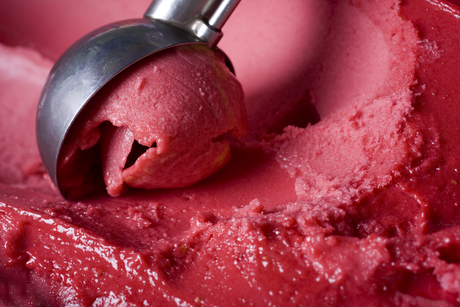Slower melting ice-cream

A naturally occurring protein that can be used to create ice-cream that is more resistant to melting has been discovered. The protein binds together the air, fat and water in ice-cream, creating a super-smooth consistency.
The new ingredient, BslA, could enable ice-creams to keep frozen for longer in hot weather. It could also prevent gritty ice crystals from forming, ensuring a fine, smooth texture like those of luxury ice-creams. The development could allow products to be manufactured with lower levels of saturated fat — and fewer calories — than at present.
Researchers at the Universities of Edinburgh and Dundee developed a method of producing the new protein — which occurs naturally in some foods — in friendly bacteria. They estimate that ice-cream made with the ingredient could be available within three to five years.
The protein works by adhering to fat droplets and air bubbles, making them more stable in a mixture. Using the ingredient could offer significant advantages for ice-cream makers. It can be processed without loss of performance and can be produced from sustainable raw materials.
Manufacturers could also benefit from a reduced need to deep-freeze their product, as the ingredient would keep ice-cream frozen for longer. The supply chain would also be eased by a reduced need to keep the product very cold throughout delivery and merchandising.
BslA was developed with support from the Engineering and Physical Sciences Research Council and the Biotechnology and Biological Sciences Research Council.
Professor Cait MacPhee, of the University of Edinburgh’s School of Physics and Astronomy, who led the project, said: “We’re excited by the potential this new ingredient has for improving ice-cream, both for consumers and for manufacturers.”
Dr Nicola Stanley-Wall, of the University of Dundee, said: “It has been fun working on the applied use of a protein that was initially identified due to its practical purpose in bacteria.”
Mimicking meat: texture science for plant-based meats
Stanford engineers are developing an approach to food texture testing that could pave the way for...
What's new on the shelf in the lead-up to Christmas
Chocolate baubles, fruity snacks, Milkybar milk and instant coffee with a cool twist are some of...
A vision of a food trend
Research at the University of Sydney tested the reactions of more than 600 people making food...














